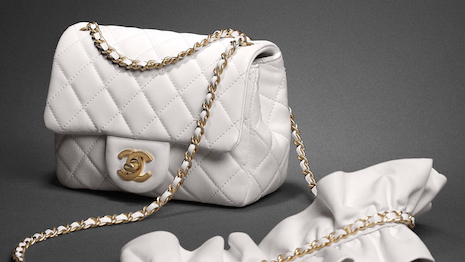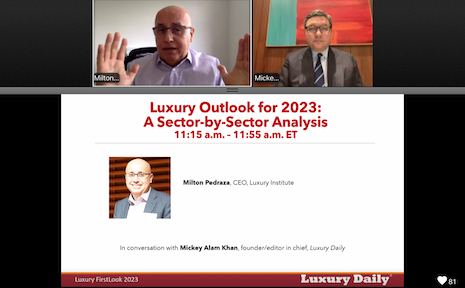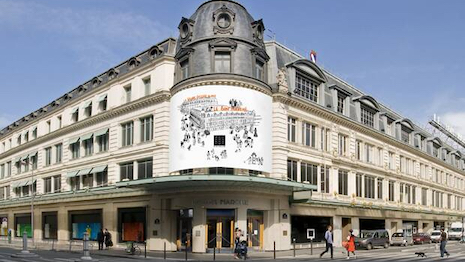 Chanel first increased prices on leather goods at the beginning of the pandemic. Image credit: Chanel
Chanel first increased prices on leather goods at the beginning of the pandemic. Image credit: Chanel
In the face of an incoming recession, experts are sending a clear message: luxury shoppers are resilient, but this does not render them foolish.
Luxury FirstLook 2023 tapped the leader of top research, training, and elite business and personal data technology solutions partner Luxury Institute for a conversation on the prospects for key sectors in the luxury business. Warning against commonly-held assumptions concerning affluent consumers and sticker shock, the expert served as a panelist, offering sector-by-sector business analysis and forecasts during the digital event.
“The wealthy and ultrawealthy are sick of the price increases for the same product,” said Milton Pedraza, CEO of Luxury Institute, New York.
“Don’t think that they’re resilient to the point of being fooled.”
The Jan. 26 Luxury FirstLook 2023 digital event was moderated by Mickey Alam Khan, editor in chief of Luxury Daily, New York.
State of play
Following fairly optimistic outlooks presented by previous panelists, Mr. Pedraza began his segment with a matter-of-fact macroeconomic context.
“I think we are still in a period of global fragility,” Mr. Pedraza said.
“Central banks continue to raise interest rates,” he said. “In New York, if you rent [right now], 60 percent of your income is going to rent.
“In Miami, it is 40 percent and in L.A. it is 40 percent — it used to be 22 percent.
The expert explains that high interest rates and inflation impact the buying power of luxury’s base, to varying extents.
“High interest rates we believe — and that is the key metric — are bringing about a mild to midlevel global recession, but we believe it will be short-lived, and it will start to recede in 2024,” Mr. Pedraza said.
Tech layoffs are also to be factored in, says the CEO, considering that stock options and other net worth builders are on the chopping block alongside these positions.
Besides economic standing and workforce cuts, Mr. Pedraza speaks to a third reality influencing luxury’s standing, this one slightly more positive.
Chinese recovery is strong, according to the expert, who states that due to notable sociopolitical tensions such as governmental grievances that are causing the outflow of wealthy residents to places such as Singapore, risks remain when it comes to the region.
“Another factor that we are not figuring into the equation is the potential for a major cybersecurity event,” Mr. Pedraza said, referencing the war in Ukraine as the source.
Overall, however, Mr. Pedraza’s team expects subdued growth, driven in large part by the top 20 percent of consumers.
“For many brands, the top five percent of clients give them 40 percent of the sales,” Mr. Pedraza said.
 Luxury Daily founder and editor in chief Mickey Alam Khan in conversation with Luxury Institute CEO Milton Pedraza. Image credit: Luxury Daily
Luxury Daily founder and editor in chief Mickey Alam Khan in conversation with Luxury Institute CEO Milton Pedraza. Image credit: Luxury Daily
“The next 15 percent give them 30 [percent of sales], so there is a “30/70” rule, and those are very resilient consumers,” he said. “But the bottom 80 percent of consumers are more susceptible, more vulnerable, they account for 30 percent of the sales.”
The speaker then proceeded to dive into categorical predictions, revealing that, for instance, fashion and leather goods growth will be up in mid-single digits, leaning more toward the success of leather goods than apparel, which Luxury Institute foresees remaining flat.
He notes that price increases have outpaced volume, mix and foreign exchange, and expects price increases to flatline this year, as even the wealthiest luxury shopper grows frustrated with paying more for a product of minimal difference from its lesser-priced counterpart.
“They’re telling us in their interviews, ‘enough is enough,’ and you need to listen to them,” Mr. Pedraza said.
The expert goes on to mention predicted growth for perfumes and cosmetics — the category is typically the most resilient indulgence in a downturn — as well as travel and hospitality — up in 2023, but within the low double digits with airline disruptions and international conflicts challenging pent-up demand.
Automotive does not appear to be on a growth trajectory, despite ongoing luxury EV advances (see story).
“Supply has improved after a down year, but we think that high prices and interest rates at 6, 10 percent are going to dampen demand, especially for younger consumers,” Mr. Pedraza said.
Forecast for medium single-digit growth are wines and spirits, with limited innovation, lower home consumption and insider reports questioning the future performance of bars and restaurants. With more stress comes more consumption though, admits the expert, insinuating that the recession could mark good news for this sector specifically.
Lastly, Luxury Institute expects watches and jewelry — watches remain a defining statement for wealthy individuals — to heighten to high single digits.
“That quality over quality [mindset] continues as people do look for investment pieces,” Mr. Pedraza said.
Next steps
Interestingly, insights shared during the Luxury FirstLook event regarding retail’s 2023 path align with recent earnings results (see story).
“We think [luxury retailers] are up in low single digits [in 2023],” Mr. Pedraza said.
 Selective retailing was the second-highest performing business group for LVMH in 2022, serving as the foundation of full-year fiscal success. Image credit: LVMH/Le Bon Marché Rive Gauche
Selective retailing was the second-highest performing business group for LVMH in 2022, serving as the foundation of full-year fiscal success. Image credit: LVMH/Le Bon Marché Rive Gauche
“Consumer preference is to buy more in the store, and there is going to be less online.”
He does note that many brands are opting to go direct, bypassing multichannel retailers entirely. This, plus poor service due to obsolete training and labor shortages could pose a threat to retention, referrals and transaction values, all of which hit at bottom lines.
The Ultra High Net Worth Institute board member’s insights come with extended accreditation.
A luxury marketing expert citing customers such as Gucci, Bottega Veneta, Intermix and Porsche, and having himself served as a senior executive in several countries, future forecasts expressed throughout the webinar are backed by Mr. Pedraza’s experience aboard the C-suite, and with clients. Over the last two decades, Luxury Institute has served over 1,100 luxury and premium goods and services brands.
“The luxury industry has had to reinvent itself many times over the last 20 years,” Mr. Pedraza said.
During annual sessions of up to 90 minutes, Luxury Institute surveys over 1,000 individuals and families around the world. These UHNW earners share their opinions, preferences, lifestyle arrangements and more with the firm.
All in all, Mr. Pedraza’s presentation kept true to the promise delivered at the kickoff of his Luxury FirstLook 2023 segment.
“I think I am going to reinforce some of those points, [and] I think I am going to disagree with some of them,” Mr. Pedraza said.
“But what I hope that will give you is a very different perspective.”